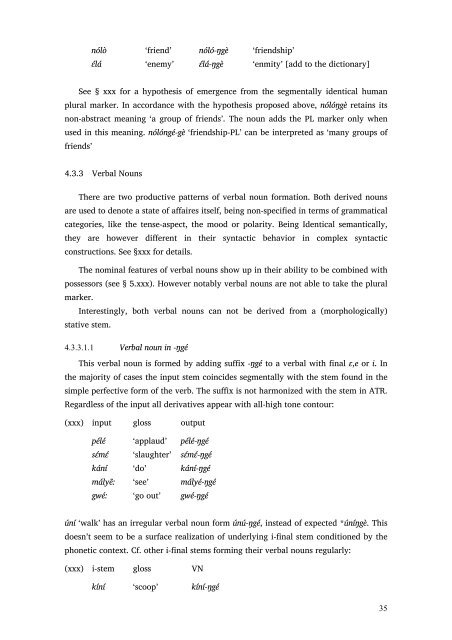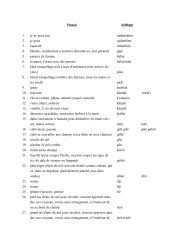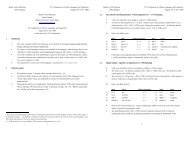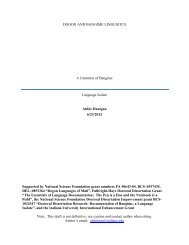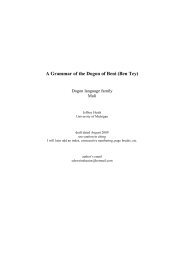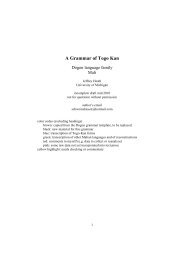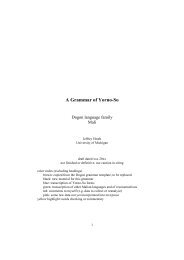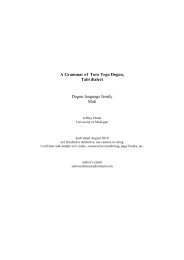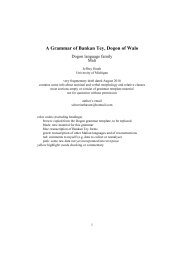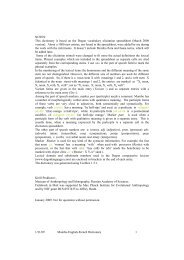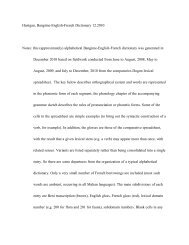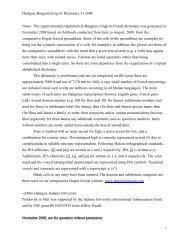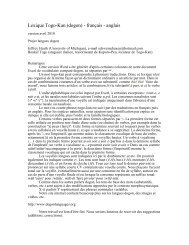- Page 1 and 2: A Grammar of MomboSongho DialectDog
- Page 3 and 4: Contents3.2.2 Metrical structure of
- Page 5 and 6: 6.3.3.1 Adjective sequences 1036.3.
- Page 7 and 8: 10.2.3.2 Experiential Negative -té
- Page 9 and 10: 13.1.7 Focalization of postposition
- Page 11 and 12: (xx2)bɛĺíhókkòanimal pen‘ani
- Page 13 and 14: To argue that the distinction betwe
- Page 15: experiential perfect + + e/ɛVN in
- Page 21 and 22: kállè ‘get ready’kíllɛ̀
- Page 23 and 24: marker is attached.(2) PL Marker:(1
- Page 25 and 26: What patterns (xx6b), (xx7a) and (x
- Page 27 and 28: In (xx17), {H} stretching plural d
- Page 29 and 30: ‘bat (mammal)’ kìjì-kíjí k
- Page 31 and 32: Note, however, that ńdá-gé has {
- Page 33 and 34: are nouns, when elicited, receive g
- Page 35 and 36: 4.2.5 Final reduplications in nouns
- Page 37 and 38: formation pattern. Two clear cases
- Page 39 and 40: ánákájì ‘bravery’ ánákáj
- Page 41: jó:ⁿ ‘fight jó:ŋgà ‘scrap
- Page 45 and 46: nɔńɛ́ ‘write’ (nɔǹì) nɔ
- Page 47 and 48: By contrast, when a non-subject foc
- Page 49 and 50: Basic personal pronouns are given i
- Page 51 and 52: See § 8.xxx for details.4.5 Demons
- Page 53 and 54: 4.5.1.2 Anaphoric/logophoric demons
- Page 55 and 56: 2 ìnjɛ̀-ndó bó:.dog-withbe3 í
- Page 57 and 58: 4.6 AdjectivesAdjectives are not di
- Page 59 and 60: If an ordinary high-toned imperfect
- Page 61 and 62: II.b. final nasalizationkóló ‘w
- Page 63 and 64: írí-bírìólé-ólèúlú-úlù
- Page 65 and 66: goat.L other‘another goat’(xx.b
- Page 67 and 68: a. ‘hundred’ sìŋgì ndó pɛ
- Page 69 and 70: 6 Noun Phrase structure6.1 Organiza
- Page 71 and 72: (xx3) ɔńdɔ́ yɛ̀: gún-yé sé
- Page 73 and 74: The similar problems in their appli
- Page 75 and 76: ‘I’ll take all that lie over th
- Page 77 and 78: goat.L‘this goat’this(xx2) ùn
- Page 79 and 80: A similar analysis can be applied t
- Page 81 and 82: A fuller discussion on the definite
- Page 83 and 84: (xx4) ámárù bámbúlàA. hat‘A
- Page 85 and 86: ‘(a) cluster of (fruits of) wild
- Page 87 and 88: 6.2.1.2 {HL} nouns in the possessor
- Page 89 and 90: (xx1) dèbù nɛ́:ŋgúlùhouse.L
- Page 91 and 92: ‘Amadou’s sheep’IV. Partitive
- Page 93 and 94:
The list of such nouns is not confi
- Page 95 and 96:
The short stems, as they defined ab
- Page 97 and 98:
-mb- follow the pattern of the shor
- Page 99 and 100:
friend.L new P.3SG(xx3) *nòlò-nà
- Page 101 and 102:
(xx3) nòlò kùnjù yɛńàfriend.
- Page 103 and 104:
One can conclude from examples (xx1
- Page 105 and 106:
The question remains whether these
- Page 107 and 108:
‘His/ her (way of) slaughtering g
- Page 109 and 110:
6.3.3.1 Adjective sequencesIf a nou
- Page 111 and 112:
(xx3) dèbù wɛ̀rɛ̀dɛ̀ bây
- Page 113 and 114:
(xxx) dèbù kó:ló léngé-léng
- Page 115 and 116:
‘three women’ (lex. yɔ́:-gè
- Page 117 and 118:
possessed noun marking > marking be
- Page 119 and 120:
‘Every man wants to have a son’
- Page 121 and 122:
normally ‘all’ (universal quant
- Page 123 and 124:
7 Coordination7.1 NP coordination7.
- Page 125 and 126:
(xx2b) * mí: ńdô: Séydù ńdô:
- Page 127 and 128:
The construction with má: can be u
- Page 129 and 130:
Here Mombo follows a pattern attest
- Page 131 and 132:
A regular derivation pattern in Mom
- Page 133 and 134:
kú:yɛ́-lɛ̀ ‘reappear, come b
- Page 135 and 136:
(xx1)I. the deriving stem is unboun
- Page 137 and 138:
The reversive verbs have the whole
- Page 139 and 140:
‘put (a) stick on some one else's
- Page 141 and 142:
jábé ‘be on vertical surface’
- Page 143 and 144:
[+ATR] péndé ‘(a stick) break
- Page 145 and 146:
inchoative). This option is not ava
- Page 147 and 148:
This means that one cannot predict
- Page 149 and 150:
wɛǵú-lɛ̀wɛǵú-lá-mì‘pull
- Page 151 and 152:
kóndómìdúŋgú kɔŕɔḿimúnd
- Page 153 and 154:
Probably here we deal with divergen
- Page 155 and 156:
kóŋgólè‘collect (last bit of
- Page 157 and 158:
as ‘soak’ (xx1) while -ga allow
- Page 159 and 160:
(xx4) Semantic development from Cau
- Page 161 and 162:
9.5 Inchoative -yV/-yV:Suffix -yV/-
- Page 163 and 164:
-ATR jɛ́ŋgɛ́ ‘be bent’ jɛ
- Page 165 and 166:
íyá ‘lie’ bí:-yè ‘lie dow
- Page 167 and 168:
mɔḿbɔ̀ ‘stand in with sb’
- Page 169 and 170:
wílyê:wízílyê:yígídyê:‘(s
- Page 171 and 172:
9.6 Ambi-valent verbs without suffi
- Page 173 and 174:
ságù ‘confidence, trust’ ság
- Page 175 and 176:
10 Verbal inflection10.1 Inflection
- Page 177 and 178:
certain point in the past, which th
- Page 179 and 180:
can be used most conveniently to de
- Page 181 and 182:
These two paradigms show two differ
- Page 183 and 184:
Monosyllables also vary in terms of
- Page 185 and 186:
10.1.3.2/xxx/ ‘see’Verb mályê
- Page 187 and 188:
structureexample glossVCV égé ‘
- Page 189 and 190:
(xx6) Bisyllabic stems: correlation
- Page 191 and 192:
kó: nà sáyélèkó: nà yúgúj
- Page 193 and 194:
yígídyê:‘(sth) vibrate, be sha
- Page 195 and 196:
10.2.1.2Perfective-1a -xxx-, Perfec
- Page 197 and 198:
The experiential perfect is formed
- Page 199 and 200:
The unmarked (most common) Imperfec
- Page 201 and 202:
Formation of the series 3 prospecti
- Page 203 and 204:
If followed by a suffix as -yV (ser
- Page 205 and 206:
in other paradigms the series 4 for
- Page 207 and 208:
ǹkè:gyó-mì ǹkè:gyòmí…Tona
- Page 209 and 210:
sample glosses ‘be leaning (on st
- Page 211 and 212:
paradigm of bE- with subject-pronom
- Page 213 and 214:
‘She/They had seen me.’‘He ha
- Page 215 and 216:
gloss IMP PERF HORTslaughter sɛḿ
- Page 217 and 218:
There is often a phonologically dis
- Page 219 and 220:
is morphophonologically complex, gi
- Page 221 and 222:
11 VP and predicate structure11.1 R
- Page 223 and 224:
??? Ámárù mǐ:wⁿ yá:gù mály
- Page 225 and 226:
Interestingly, even verb dwɛ́: 'd
- Page 227 and 228:
11.1.4 Sole argument agentive (uner
- Page 229 and 230:
In the following verb égé 'come'
- Page 231 and 232:
additionally specified by the modif
- Page 233 and 234:
lion humter-OBL 1kill.PFV.3SG‘(a)
- Page 235 and 236:
(xx3)wálé káná: ń-sâ:work do.
- Page 237 and 238:
11.1.12 Fixed subject-verb combinat
- Page 239 and 240:
The other less frequently found pat
- Page 241 and 242:
tàgù tágé ‘say sth false’ C
- Page 243 and 244:
The second case is much more proble
- Page 245 and 246:
(xx1)ɛ́: éjé=là3SG Dogon-it.is
- Page 247 and 248:
3SG=OBL‘it was him’1be.3SG=PAST
- Page 249 and 250:
‘There are 3 sheep’It’s much
- Page 251 and 252:
does not allow aspect-negation morp
- Page 253 and 254:
‘put (in/on)’ verb, or an irreg
- Page 255 and 256:
mealP.2SG-part little.bit 1 1SG-sta
- Page 257 and 258:
Series 3(xx1) Non-subject focus, qu
- Page 259 and 260:
ínjɛ̀ ní:wɛ́-nɛ́ síyá-nà
- Page 261 and 262:
Adding the OBL marker to the constr
- Page 263 and 264:
Séydù débú-gèS [house-PL].HL(x
- Page 265 and 266:
Defective stative quasi-verb, argua
- Page 267 and 268:
The iteration may be uninflected (b
- Page 269 and 270:
Direct objects (P and T arguments)
- Page 271 and 272:
(28) Truth-value focusA: yɔ̀: bâ
- Page 273 and 274:
less topicalmore topicalTAM and tru
- Page 275 and 276:
ínjè àmàlà tɛńdí-yàmálá-
- Page 277 and 278:
áyérû:ⁿ wô: yɔĺá: ḿbíy
- Page 279 and 280:
13.2.2‘Who?’ (xxx)In this and o
- Page 281 and 282:
used with Locative postposition or
- Page 283 and 284:
such a construction may also be use


